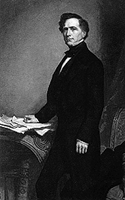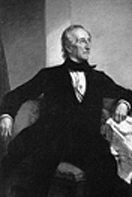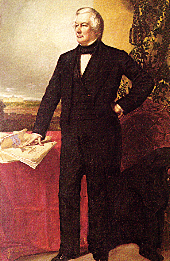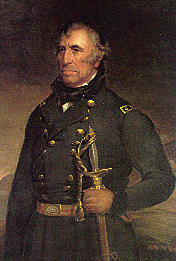
The Center
for
Socratic
Principles:
The New
Whig
Party
Home
WhigCentral
The
NWP Quiz
The
American
Pageant Quiz
The
US Consitution, Bill of Rights, and the Amendments
Essays
The
NWP on
Yahoo!
The
Center's
Sponsors
A
News
Article I Liked
Send
us your
Comments





 |
[Large files cannot access random lines.]
Why do whigs act the way they do?
This is a question I'm asked quite
often. Why do Whigs love Zach Taylor? Why is Andrew Jackson
the incarnation of Satan on Earth? Well, this page is to explain
some of the deep seeded feelings the Whigs have against or for people.
Click here
for a Graphical Representation of the people Whigs despise most.

President Andrew Jackson (AKA King Andrew the First (in
veto memory), AKA The Devil, Satan, Mephistophele, Bealzibub)
Why Whigs HATE Andrew Jackson:
-
The Spoils System
-
He beat Henry Clay
-
Wildcat banks
-
The BUS #2
-
The Trail of Tears
-
Marty was the troll on the back of his horse
-
He fought a battle after the war was over
Well, there's the list. Here's some explanation.
When ol' Andy Jackson first ran for office in 1824, he lost, though he
gained the most of the public's votes. However, some obscure constitutional
law (since killed by an amendment) said that in this election, the Senate
would decide the next president. Andy Jackson beat out Henry Clay,
a staunch Whig and arguably the best statesman before Kissinger, in that
election. When he ran again in 1828, he won with a majority of the
Electorate and the popular vote. Any of you who have seen the popular
9mm film about Andy's first days in the White House when I say that his
first few days in the White House were... tumultuous. This was not
the Fates dealing him a bad hand. He threw parties for hicks in the
White House. Drunken, uneducated, unwashed, inbred, ignorant, jug-bearing
hicks were welcomed into the White House with open arms. Some of
these drunkards would be cabinet members. This is a mere example
of the spoils system. If he liked you, he would find you a job, no
matter its qualifications, or yours. He killed the idea of a respectable
presidency but good.
Second, he beat Henry Clay in the election of 1828.
This is sacrilidge! He should be scorned for that if nothing else.
Under the Jacksonian system, such that it was, many people
got into real estate speculation. Many so-called "wildcat" banks
sprang out of the dust of the territories selling property. They
took your money and then suddenly went bankrupt. Jackson eventually
put a stop to this, but I won't een mention the credit mobiler scandal!
The Second Bank of the United States was not such a bad
thing. It was villified because its leaders were corrupt, but that
was no reason the condemn it altogether. Anyway, the Bank's charter
came up for renewal in 1830, and who let it slip away quietly, but Andy.
This is the one thing that makes me think that Andy Jackson
was possessed by Satan's minions of darkness. In 1831, he forcibly
moved the Cherokee, the most civilized of the Indian tribes, to Oklahoma.
I can't even begin to go into detail, but the Chief Justice of the Supreme
Court, John Marshall (the best Chief Justice ever, by far) decided that
Jackson couldn't order them moved. In a fit of unconsitutionality,
Jackson said "Justice Marshall has made his decision, now let him enforce
it." With these words, 1/3 of the Cherokee Nation died on Nunna
Dual Tsunyi: The Trail Where We Cried. This act of treason and
subversion was grounds for Jackson's dismissal, but nothing came of it.
He lived on as a hero. We all know he is a bastard and was unfit
to be President.
Some of you may have seen the political cartoon portraying
Andy Jackson riding a horse, chasing Henry Clay and his horse, seen tripping
over a rock (The American System Clay proposed), with some sort of troll
riding on the flanks of Jackson's horse. Upon closer inspection,
we see that the troll is in actuality: Van Van, the used up man!
Little Marty, the Little magician, the Wizard of Albany, was really a troll
at the beck and call of Andy Jackson.
Finally, back in 1814, when the war of 1812 was coming
to a close, Andrew Jackson went to New Orleans. As the war was declared
over by treaty, Jackson fought the Battle of New Orleans 2 weeks after
the treaty was signed. He fought a battle after the war was over.
What next?

Now, on to Van Van, the Used Up Man, Marty van Buren
-
He is a troll
-
He DARED to run against Zach Taylor
-
He is the Anti-Whig
As seen in the Jacksonian section, Marty is a troll.
He is a troglodyte, a throwback. He is the "Little Magician" "Wizard
of Albany" "The Dapper" Van Buren. Whigs charged that when he ran
for office again (after being defeated on the Democratic ticket) as a Free
Soiler, "Van Van is a used up man." This was very true, indeed.
He sucked as a president.
In 1848, he had the gaul to run against the most popular
man in the country, General Zachary Taylor. Van lost by a longshot.
Serves him right, if you ask me.
Finally, by running against Zach Taylor and by being
in all ways against the precepts of Whigdom in general, Van is declared
one of the true Anti-Whigs.

Frank Pierce
-
Who is Frank Pierce? The Young Hickory of the Granite
Hills!
-
He beat General Winfield Scott in '52
When he ran for office in 1852, he was a no-name. Democrats
nominated him as their candidate. Nobody knew him. Everybody
knew Ol' Fuss 'n' Feathers, General Winfield Scott! He was one of
the heroes of the Mexican-American War! What a person to follow in
the footsteps of Zach Taylor and Millard Fillmore but a fellow Whig who
was also a war hero! Well, the dark horse no name Democrat won, sending
the final nail in the Whig coffin. Scott was the last Whig
ever to receive more than 1% of the popular vote. Sad, but
true.

John Tyler: The Worst President Ever
-
He was a turncoat
-
He started off as the Whig VP and ended up as a Democrat
Prez
Though in his 2-year term as president, he didn't do much
that is noteworthy today, but there is one thing that many history books
mention. He ran on the "Tippecanoe and Tyler Too" platform, with
Whig war hero William Henry Harrison, the hero of the Battle of Tippecanoe.
Both were Whigs at the time. However, when WHH became the first president
to die in office, Tyler took over. Suddenly, he turned his backs
on the Whigs, the party that got him elected in the first place.
He turned into a Democrat and thus he is remembered as the turncoat Whig.
Let noone speak his name without spitting first. May whatever God
you believe in have mercy on his soul.
A Brief Note on Mark Hanna and His President, William
McKinley
"I would rather be president than be right!" With
these immortal words, Henry Clay stopped his bid for election in 1832.
However, 70 years later, somebody would spit on his grave by using a bastardization
of those words to their own devious needs. William McKinley was not
a president. Sure, he was elected and sworn in and got a paycheck
and everything, but the real power lay in Mark Hanna. He has McKinley
under his thumb the whole time he was in office. Sometime during
McKinley's term, Hanna uttered these seditious words: "Than man Clay was
an ass. I'd rather be president than be right." I'd rather
be president than be right. For that, Whigs everywhere hate him.
For an interesting graphical representation of the Whigs'
favorite people, click here.

Henry Clay
-
The American System
-
Anti-Jacksonian
-
He formed the Whig Party
-
He was a great statesman
I can't remember much about the American System specifically,
but I do remember it was good. I remember only that it was a massive
internal improvements bill that would have made roads, canals, etc.
A shame it got killed by Andy.
He ran against the strong candidate, Andrew Jackson,
in 1828. That's reason enough to love him.
When he and John C. Calhoun (who commanded the sun to
stand still, indicentally) joined forces in 1833 (effectively founding
the American Whig Party, he immortalized himself. The Whig's agenda
was simple: kill the Jacksonian system, be silent on the annexation of
California and about slavery, and legislate morality. These simple
precepts made the foundation for the only successful third party in American
history.
Henry Clay was a great man. He founded the Whigs,
ran against Andy, came up with the American System, and was the Speaker
of the House for many years. He was an accomplished statesman during
his tenure as a representative, and indeed beyond. He was the epitome
of a Washington insider. I would go so far to say that he and Henry
Kissinger were the best statesmen ever. Clay was the best at internal
affairs, Kissinger the best at foreign affairs.

William Henry Harrison
-
He was the Hero of the Battle of Tippecanoe
-
He lived and died a Whig
-
He had a major fault: "Tyler too"
Both of the 'real' Whig presidents were war heroes.
Taylor was one of the 2 generals (both Whigs, incidentally) who came out
of the Mexican-American War as heroes, and William Henry Harrison (grandfather
to President Benjamin Harrison) was the hero of the Battle of Tippecanoe.
He was the governor of Illinois, I believe, and during his reign, he fought
the Indians. One such battle was near the small Indian villiage of
Tippecanoe. After routing the Indians, he went on to the presidential
trail with the slogan "Tippecanoe and Tyler too."
Both of the 'real' Whig presidents died in office.
Taylor died 2 years into his term, and poor old Harrison died a mere 6
months into his. This war hero turned president was a Whig to the
end. His last days were spent in the embrace of Whigs everywhere.
What a noble death.
The one downside of Harrison's presidency was his choice
of runningmates. He chose John Tyler, a longtime Whig. However,
with Harrison's death, the evil Tyler changed sides and turned into a villanous
Democrat. As you read earlier in the section about Tyler, this evil
satanic person was the worst president, hands down, because he got elected
on the Whig ticket, with a Whiggish war hero president, who died, so Tyler
siezed the opportunity and made himself a Democrat. He's evil, and
he's the single bad point of Harrison's presidency.

General Winfield "Ol' Fuss 'n' Feathers" Scott
-
He's a war hero Whig (the best kind)
-
He's MacArthur 100 years earlier
-
He's a good Whig who wanted to be president very very very
badly
There is only one kind of Whig: a war hero. Anybody
else is a conscience Whig or a Democrat. General Winfield Scott (for
whom Scottsdale, AZ, is named) was the man who led the American forces
into the Halls of Montezuma (figuratively speaking) and Mexico City.
With Taylor in the North and Scott in the South, the Mexican-American War
was won. Scott and Taylor returned as heroes and one became president
in 1848. Scott, however, ran in 1852 against the little-known Democrat
by the name of Frank Pierce. "Who is Frank Pierce?" critics said,
to which the reply was "The Young Hickory of the Granite Hills!"
First off, the way to sway Whigs is not to compare him to Old Hickory,
AKA Jackson. Second, he's a dark horse. He had no chance of
winning, right? Well, Ol' Fuss 'n' Feathers, who preferred pomp to
anything else, lost with a mere 1.6% of the popular vote to Frank Pierce.
This devastating loss spelled the end for the American Whig Party.
No other Whig candidate since has received more than 1% of the popular
vote. That's a shame, especially because this great war hero who
wanted to be president so very badly will forever be remembered as the
Whig candidate who killed the Whig party.
MacArthur (before he was sacked by Harry S.) was a war
hero par excelance. He won the battles in the Pacific Theatre (though
don't get me stared on his Phillipines campaign), and then executed the
brilliant landing at Inchon in Korea. Ike aside, he was the most
popular general of the postwar period. Scott (before he lost the
Pierce in '52) was a war hero par excelance. He struck the decisive
blow in the Mexican-American War by taking Mexico City. Taylor aside,
he was the most popular general of the 1840's.
The other similarity between Scott and Little Mac was
that both wanted desperately to be president. While MacArthur shot
himself in the foot, politically speaking, by being fired by Truman, Scott
kept his nose clean and was at least able to be nominated. He lost
by a landslide, though, and the rest is history.

Millard Fillmore
-
He's the running mate of Zachary Taylor
-
His concillatory policied delayed the Civil War
Millard Fillmore is the least well-known of the major Whigs.
He is often confused for being a Democrat. No, that title is reserved
for John Tyler. Millard Fillmore spent 1848-1850 as the Vice President
of Zachary Taylor. This alone says a lot. However, when Taylor
died on July 9, 1850, Fillmore became the second Whig to be thrust into
the presidency. However, a mere several days after Taylor's death,
his entire cabinet resigned. Fillmore immediately appointed longtime
Whig Daniel Webster to be the Secretary of State, thus proclaiming his
support of the moderate Whigs in favor of the Compromise of 1850.
His support for the Compromise and his refusal to sign the Fugitive Slave
Act infuriated northern Whigs, who saw to it that Fillmore didn't receive
the party nomination in 1852. After the Whig party's disintegration
in the 1850's, Fillmore joined the Know-Nothing Party, opposed Lincoln's
ideals about the Reconstruction, and supported President Johnson.
Though in his prime, he was revered by all, it seems evident that the death
of Zachary Taylor affected his mind in many ways. Why else would
a Whig die a Know-Nothing?

The Hero of Buena Vista, Ol Rough 'n' Ready, President
Zachary Taylor
-
The epitome of Whiggism
-
He delayed the Civil War
-
He was a war hero (surprise surprise)
What can one say about General Zachary Taylor? He was
a man of the people. In as much as Scott was MacArthur, Taylor was
Eisenhauer. Ike and Taylor were simple men, war hero generals, and
immensly popular after their respective wars. Ike hopped in the proverbial
helicopter and flew above the political fray of the early 50's. Taylor,
and indeed the Whigs, were mum on many touchy subjects. Taylor was
a man whose life ambitions never included being president. In fact,
he didn't even know he was nominated by the Whigs as their presidential
candidate until 3 weeks after the nominating convention. He accepted,
thankfully. He ran against Lewis Cass, who was in favor of popular
sovereignity (letting the people of the respective states decide if slavery
was legal there). Taylor owned slaves himself, so Taylor got the
Southern votes. He treated his slaves well, and was silent on the
issue of slavery (and so was an abolitionist by default), so he got the
northern vote. His candidates were Lewis Cass, who was in favor of
"Squatter Sovereignity," and Van Van the Used Up Man, so he managed to
win the election of 1848.
Once in office, he used his political clout to keep the
Southerners and Northerners at bay. His (and Millard Fillmore's)
expert politics help delay the civil war by a dozen years. The North
was not prepared for a war in 1850. The infrastructure would take
another decade to be finished. By delaying the Civil War, Taylor
and Fillmore probably made the North win.
While James K Polk was a military incompetant, Taylor
still managed to win in Mexico. Taylor was sent to Monterrey and
then to modern-day San Diego, where he won a decisive victory at Buena
Vista. With that, Scott was able to march into Mexico City and end
the war. Without the Battle of Buena Vista, the road to Mexico City
would have been much more difficult. On that note, I raise my glass
to General Zachary Taylor, the best president this country has ever seen.
Back
|
